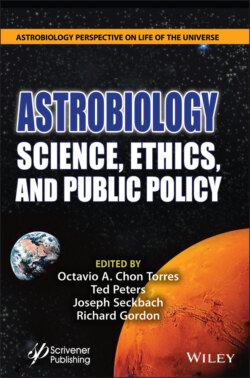Читать книгу Astrobiology - Группа авторов - Страница 44
2.4.2 What is Our Responsibility Toward Peer ETI?
ОглавлениеIn the event that the aliens with whom we make contact and engage in transplanetary community approximate the intelligence level of Homo sapiens on Earth, an astroethics of responsibility strongly suggests that we earthlings would treat them as possessing dignity. That is, we would treat our extraterrestrial equals as possessing intrinsic value; and imputing dignity is the principal form in which response and care would become manifest [2.52] [2.57] [2.66].
Might the Golden Rule provide an ethical superstructure? Jesus’ version of the Golden Rule is familiar to us all: NRS Matthew 7:12 “In everything do to others as you would have them do to you.” Even though philosopher Immanuel Kant found weaknesses in the classical Golden Rule, his categorical imperative universalized it. The formal principle from which all moral duties are derived is this: “I ought never to act except in such a way that I also will that my maxim should become a universal one” [2.38]. In short, we should treat peers as equal to ourselves; and we should care for their welfare just as we would care for our own.
Is there any reason to expect that our new friends living on a hypothetical exoplanet will have developed moral standards that correspond to ours? Yes, answers Michael Ruse. After all, extraterrestrial creatures must have evolved and adapted to the same laws of physics operative everywhere in the universe. Their logic and mathematics would be the same. Morality also? Yes, perhaps.
“Two of the greatest and most widely accepted enunciations of the supreme principle of morality are the Greatest Happiness Principle and the Categorical Imperative. The former specifies that one’s actions ought to be such as will maximize happiness [John Stuart Mill]. The latter…entreats one to regard one’s fellow humans as ends, and not simply as means to one’s own gratification [Kant]. Either or both of these could find their equivalent on our hypothetical planet elsewhere in the universe” [2.74].
Our takeaway is this: if we earthlings ascribe intrinsic value and treat intelligent aliens with dignity, it is reasonable to expect the aliens will understand us and perhaps even respond in kind. Earthling care for ETI might be accepted and, hopefully, reciprocated.
Messaging Extraterrestrial Intelligence International (METI) founder and director, Douglas Vakoch, gives voice to such an astroethical responsibility at the moment of contact. “Relevant responsibilities to address include (1) looking out for the interests of humankind as a whole, (2) being truthful in interstellar messages, and (3) benefiting extraterrestrial civilizations” [2.87] [2.88].
With METI in mind, let’s refine the peer ETI category into two subcategories: hostile and peaceful. If hostile, ETI could become a threat to us. Should we hide in hopes that we can avoid detection? Should we mount a defense? A preemptive offense?
Fearing such a threat, Stephen Hawking along with some of METI’s own advisors argue that Active SETI should be stopped. We should hide Earth electronically so that hostile aliens cannot find us. Such a rejoinder arises from the fear that aliens will turn out to be just like earthlings: beset with the desire to conquer, subjugate, and pillage.
What about a preemptive offense? One of the problems we have learned from history is that we earthlings can become unnecessarily hostile and pose a threat to our fabricated enemies. We are subject to demagoguery. Even if the ETI civilization in question is peaceful, a terrestrial demagogue could persuade us earthlings that the aliens are hostile; and we earthlings, like a mob, would support military action against them. Theologians are particularly worried about human hostility, regardless of how pacific ETI might be.
Whether hostile or peaceful, peer ETI should be afforded respect in the form of dignity. In the event that peer ETI prove to be neutrally peaceful or even benevolent, then the principles giving expression to Enlightenment values should prevail without challenge: equality, liberty, dignity, and mutuality. And, yes, we should care about their well-being if not flourishing.
